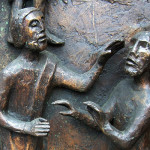We run our website the way we wished the whole internet worked: we provide high quality original content with no ads. We are funded solely by your direct support. Please consider supporting this project.

9 Reasons Faith ≠ Certainty
One of the things that Christians typically believe in and that I’ve struggled with a great deal is the concept of faith. Like most Christians, I once assumed a person’s faith is as strong as that person is certain. And, accordingly, I assumed that doubt is the enemy of faith. That is, after all, how Christians generally talk. This conception of faith raises a number of perfectly legitimate questions—the kind that we are often told not to ask, but I ask them nonetheless. For example, Scripture teaches us that we are saved by faith and that the power of prayer, whether for healing or for some other blessing, is directly connected to a person’s faith. But I’ve always wondered, why would God place a premium on one’s ability to convince oneself that something is true? What is particularly virtuous about one’s ability to push doubt aside and make oneself feel certain?
Through the years, I’ve found 9 reasons why faith is not the same thing as certainty.
- There is nothing virtuous about the ability to make yourself feel certain about things. The more rational a person is, the less they have this ability. The more simple or gullible they are, the better they’ll be. God loves simple and gullible people, but there’s no reason to think that they’re saints! Trying to feel certain your beliefs are right and trying to avoid doubt is irrational and reduces faith to a form of mental gimmickry.
- Having people believe that their salvation and other things—like whether your friend lives or dies—hang upon how certain you feel about things is psychologically torturous and presupposes an ugly, domineering/controlling mental picture of God.
- Certainty-seeking faith looks more like magic than biblical, covenantal faith in that it depends upon doing and believing certain things in order to gain God’s favor and manipulate God to benefit ourselves and others.
- The certainty-seeking model of faith leaves us with an inflexible way of approaching our beliefs and makes us vulnerable to various challenges to our belief system. Since everything is a package deal that we must buy into in order to feel loved, worthwhile, and secure, we cannot afford to think flexibly and therefore are left with a faith that is brittle and easily broken.
- Believing that one’s salvation depends on remaining sufficiently certain about right beliefs can cause people to fear learning things that might make them doubt the rightness of their beliefs. It thus creates a learning phobia that in turn leads many to remain immature in their capacity to objectively, calmly, and lovingly reflect on and debate their beliefs.
- Doubt-shunning faith tends to be hypocritical in that Christians see it as sinful for them to doubt but virtuous for non-Christians to do so.
- Certainty-seeking faith can be dangerous, as it discourages us from seriously questioning our assumptions even when we are asked to engage in questionable behaviors, such as killing people, in the service of our beliefs.
- It’s self-serving and self-deceptive to strive to feel certain while also telling yourself you’re concerned with truth. A concern for believing the truth requires us to take seriously the possibility that our current beliefs are mistaken.
- Finally, and most seriously, trying to convince ourselves that we embrace true beliefs can be idolatrous. When people feel they are loved, have worth, and are secure before God (they are “saved”) because they embrace the right beliefs, they are getting their life from their confidence in their beliefs about God rather from a relationship with God.
—Adapted from Benefit of the Doubt, pages 75-77.
Category: General
Tags: Apologetics, Benefit of the Doubt, Doubt, Faith, Religious Idolatry
Topics: Faith & Doubt
Related Reading

Podcast: How Can We Be Confident in Christianity With SO Many Other Religions in the World?
Greg considers the abundant religious perspectives available to us, defends faith in Christ, and considers whether agnosticism is appropriate—all in less that 6 mind-bending minutes! http://traffic.libsyn.com/askgregboyd/Episode_0259.mp3

Why Doesn’t God Heal When We Ask?
If we are called to manifest what Jesus manifested and revolt against what Jesus revolted against, and Jesus carried out the kingdom through healing, then why doesn’t God heal those we pray for? One of my personal kingdom heroes is a Vietnamese lady named Dr. Huyen Tranberg. She is a medical doctor who works with…

Why Bart Ehrman Doesn’t Have to Ruin Your Christmas (Or Your Faith) Part 2
This is the second of several videos Greg put together to refute Bart Ehrman’s claims published in the article What Do We Really Know About Jesus? If you missed it, you can catch the first installment here.

Have You Taken a Gospel Immunization Shot?
Why does being “Christian” in America make so little difference in so many people’s lives, when the kingdom movement revealed in the New Testament revolutionized people’s lives? This drastic difference is hardly surprising when you consider that the gospel that people are often given today is little more than a contract of acquittal that is…

Hearing and Responding to God: Part 3
We decided to change the title of this series to better reflect it’s content. Hope that’s not confusing. Greg continues his thoughts here on hearing when God speaks to us and being willing to respond even when we’re not completely certain. You can view parts one and two here and here.

ReThinking the Source of Life
Over the next few weeks, we will be exploring the twelve convictions of the ReKnew Manifesto. The first of which focuses on where we get life. In many of my writings, I speak about the source of “life.” By this I mean one’s core sense of identity, worth, significance and security. Over the years, I’ve…
